5-in-1 Vaccine For Puppies Schedule: COMPLETE Guide for Puppy Health
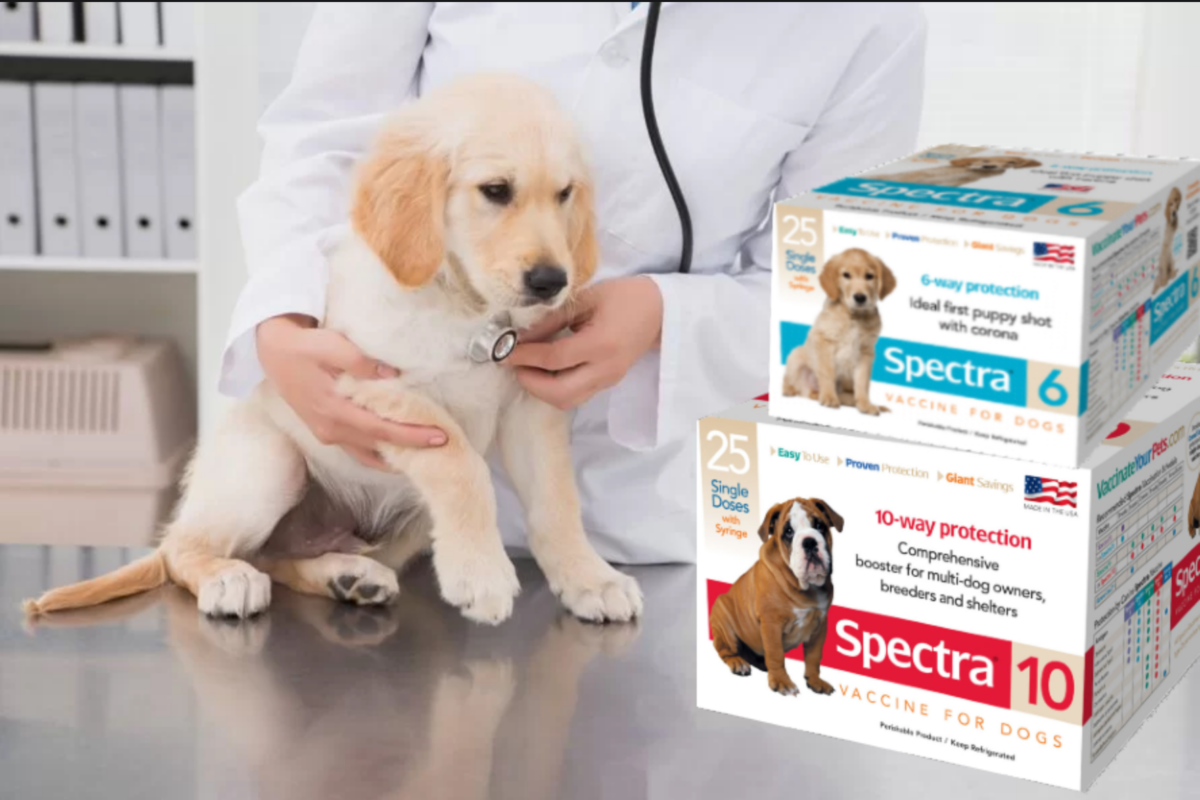
Introduction
All About 5-in-1 Vaccine For Puppies Schedule
When you go to visit the veterinarian with your new puppy, she may recommend a 5-in-1 vaccine for puppies schedule. Read on to learn all about this crucial process in vaccinating your new puppy!
Did you know that a simple 5-in-1 puppy vaccine schedule, part of the dog vaccination schedule, can be a game-changer for your furry friend? Puppy and dog vaccines, including the rabies vaccination protocol and protection against the canine distemper virus, are not only essential but also protect against multiple diseases, ensuring their overall health and well-being. These little shots hold the power to prevent potential life-threatening illnesses that could put your puppy’s life at risk.
Canine parainfluenza, the canine influenza, canine distemper virus, and canine parvovirus are just a few of many dogs the dangerous infections that can be prevented with puppy vaccines. By shielding your pup from these viruses through puppy vaccinations, puppy shots, and a rabies vaccination, you’re giving them a fighting chance to grow into happy and healthy adult dogs.
But it doesn’t stop there! The 5-in-1 vaccine also guards against puppy vaccines, dog vaccinations, puppy vaccinations, canine influenza, and canine adenovirus. With this comprehensive protection, your furry companion can romp around without worrying about falling victim to these contagious diseases.
Don’t take any chances. Make sure they receive their timely puppy vaccines, including the crucial 5-in-1 rabies shot (dhpp). It’s time to give them the best start in life with dog vaccines and the rabies vaccine!
Remember: prevention is key!
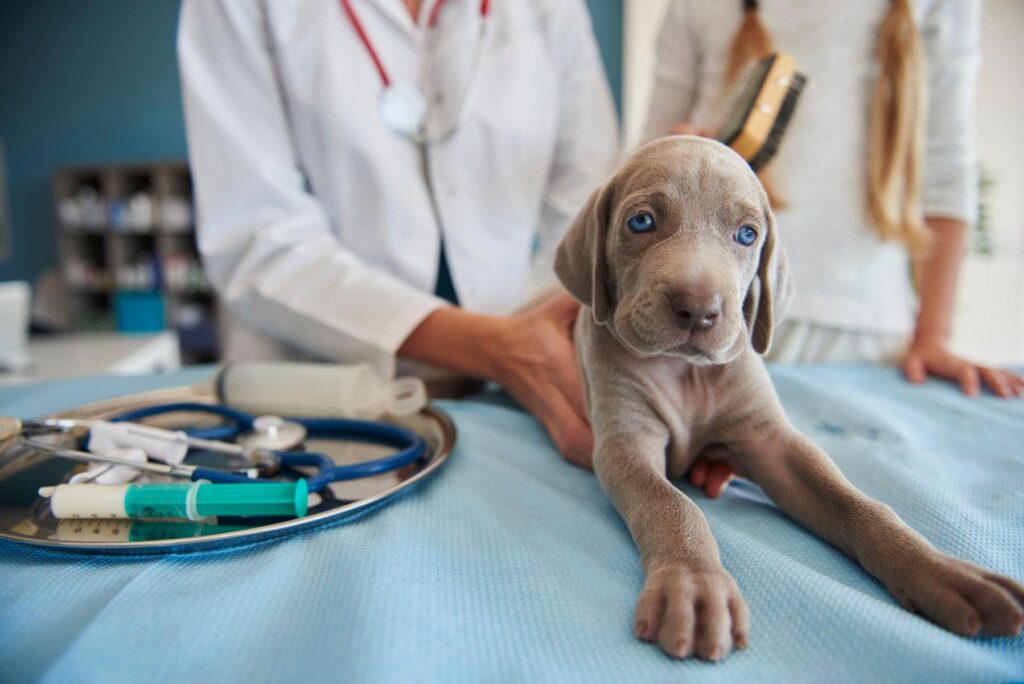
What is the 5-in-1 vaccine for puppies and why is it crucial for their health?
Combination vaccine protecting against five common diseases
The 5-in-1 vaccine, also known as the DHPP vaccine or DA2PP vaccine, is a combination vaccine that protects puppies against five common diseases: distemper, canine hepatitis a, parainfluenza, parvovirus, and leptospirosis. Each of these diseases can have severe consequences for a puppy’s health, so this comprehensive vaccine offers essential protection. Additionally, it is important to follow a dog vaccination schedule to ensure your canine companion receives all necessary vaccinations. One crucial vaccination to include in the canine hepatitis schedule is the rabies vaccine.
Distemper is a highly contagious viral disease that affects a puppy’s respiratory, gastrointestinal, and even nervous system, systems. It can lead to seizures, paralysis, and even death. Hepatitis is caused by the canine adenovirus and primarily affects a puppy’s liver. Symptoms include fever, vomiting, jaundice, and abdominal pain. Dog vaccinations, including the the DHPP vaccine and rabies vaccine, are essential to protect your pet’s health. Make sure to follow the dog vaccination schedule to ensure your dog receives the necessary immunizations.
Parainfluenza is a respiratory virus that contributes to kennel cough in dogs, our beloved canine companions. While it may not be life-threatening on its own, it can weaken a puppy’s immune system and make them more susceptible to other infections. Parvovirus, an extremely highly contagious virus also, attacks a puppy’s intestinal lining, causing severe diarrhea and vomiting which can lead to dehydration and potentially fatal outcomes if left untreated. It is important to ensure that your dog receives the necessary shots to protect them from these viruses for years to come.
Leptospirosis is contagious disease caused mostly by bacteria found in contaminated water or soil. It can be transmitted to puppies through contact with infected urine or ingestion of contaminated substances. Leptospirosis affects multiple organs including the liver and kidneys. Without treatment, it can cause organ and even kidney failure and liver failure too. Dog vaccinations and puppy vaccinations are important to prevent this disease. Cats are also at risk and should receive the shot.
Boosts puppy’s immune system
One of the key benefits of the 5-in-1 vaccine, also known as dog vaccinations or puppy shots,, is its ability to boost a puppy’s immune system. Vaccines work by introducing small amounts of weakened or inactive pathogens into the body. This stimulates the dog’s immune system to produce antibodies that recognize and fight off specific diseases.
By vaccinating puppies with the 5-in-1 vaccine, their immune system, specifically their dog vaccinations, is primed to recognize and respond to the diseases it protects against. This means that if a puppy encounters these diseases in the future, their immune system, specifically their dog vaccinations, will be better equipped to fight them off effectively. Vaccination essentially provides puppies with a head start in building immunity and defending against potential threats.
Reduces risk of serious infections
The 5-in-1 vaccine, also known as the dog flu vaccinations, plays a crucial role in reducing the risk of serious respiratory infections even in puppies. Without vaccination, puppies are vulnerable to contracting diseases that can have severe consequences for their health and well-being.
By administering the 5-in-1 vaccine, also known as dog vaccinations, according to the recommended schedule, pet owners can significantly reduce the likelihood of their puppies developing these potentially life-threatening infections. This not only protects individual pet parents and puppies but also helps prevent the spread of these diseases within communities and populations.
It’s important for pet owners to understand that vaccines are not a guarantee against infection, but they greatly enhance a puppy’s ability to fight off diseases and minimize their impact. Regular booster shots are necessary to maintain immunity throughout a dog’s life.
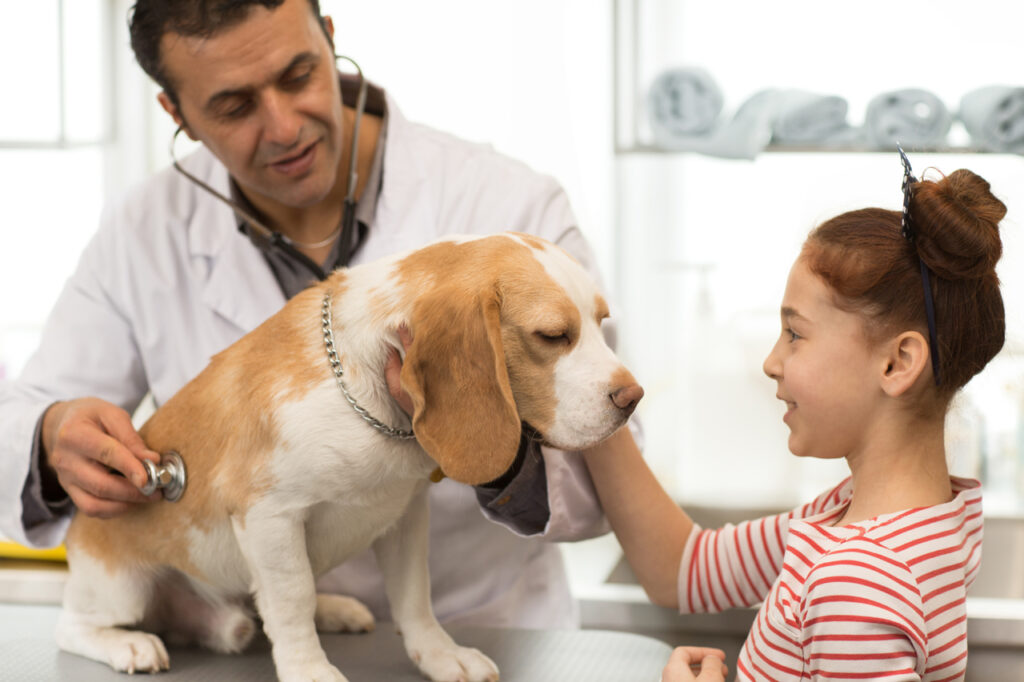
Understanding the puppy vaccination schedule and when to administer the 5-in-1 vaccine:
Follows a series of shots at specific ages
Puppy vaccinations are essential for protecting your furry friend, dog, from various diseases. The vaccination schedule typically involves a series of shots given most puppies at specific ages to ensure optimal protection. These shots help build your puppy or dog’s immune system and safeguard them against potentially life-threatening illnesses.
The 5-in-1 vaccine, also known as the combination vaccine, is one of the key components in a comprehensive puppy and dog vaccination schedule. It provides protection against five common diseases: distemper, parvovirus, adenovirus (hepatitis), parainfluenza, and leptospirosis.
Initial dose given around 6 to 8 weeks old
The first dose of the 5-in-1 vaccine for dogs is usually administered when puppies are around 6 to 8 weeks old. This timing allows for early protection of adult dog against these infectious diseases. Puppies, being a vulnerable stage of a dog’s life, require vaccinations to be started as soon as recommended by your veterinarian.
Subsequent doses spaced several weeks apart
After the initial dose, subsequent doses of the 5-in-1 vaccine for your dog are typically spaced several weeks apart. This spacing ensures that your puppy’s immune system, as a dog, has enough time to respond and develop immunity against each disease included in the vaccine.
Your veterinarian will provide you with a specific vaccination schedule tailored to your puppy’s needs. It is important to follow this dog vaccination schedule diligently to ensure maximum effectiveness of the vaccine.
During each visit for subsequent doses, your veterinarian may also perform a thorough examination on your puppy dog to monitor their overall health and well-being.
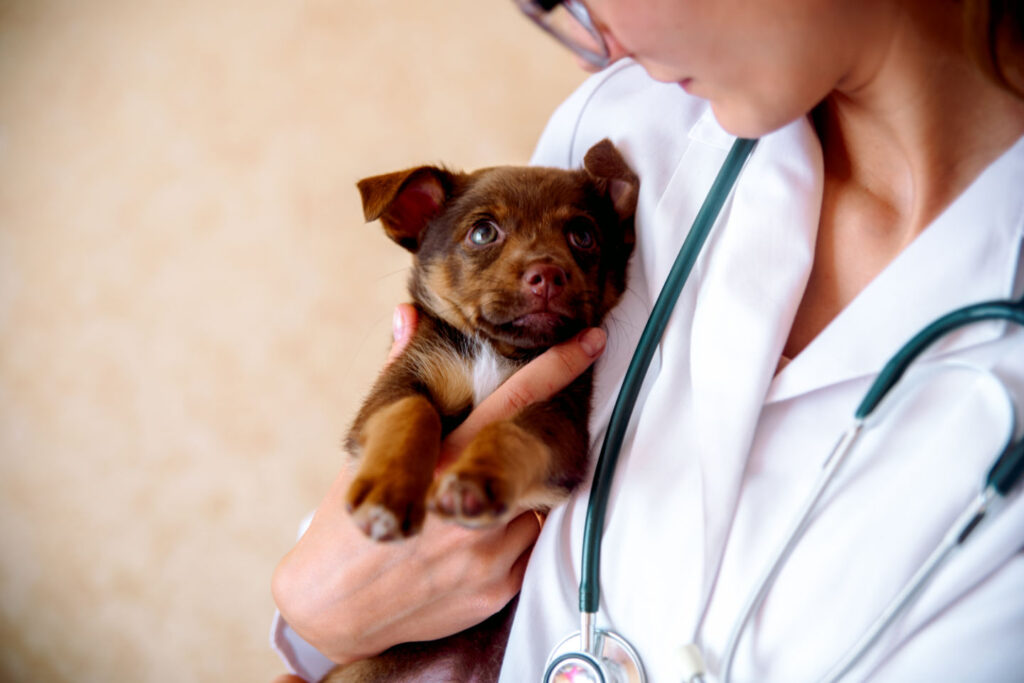
Puppy vaccination schedule
To give you an idea of how a typical puppy vaccination schedule for a dog may look like, here is an example:
6-8 weeks: First dose of the 5-in-1 vaccine
10-12 weeks: Second dose of the 5-in-1 vaccine
14-16 weeks: Third dose of the 5-in-1 vaccine
12-16 months: Booster shot to reinforce immunity
It’s important to note that this is just a general guideline for your dog, and your veterinarian may adjust the schedule based on your puppy’s specific needs.
Single injection convenience
One of the benefits of the 5-in-1 vaccine is that it combines multiple disease protection into a single injection for your dog. This not only reduces the number of shots your puppy needs but also minimizes stress for both you and your furry companion.
The convenience of a single injection makes it easier to stay on track with your puppy’s vaccination schedule. It ensures they receive all necessary vaccinations without unnecessary delays or missed doses.
By following the recommended puppy vaccination schedule and administering the 5-in-1 vaccine at appropriate intervals, you are taking proactive steps to protect your beloved pet from potentially devastating diseases. Consult with your veterinarian to create a personalized vaccination plan for your puppy and give them the best start in life!
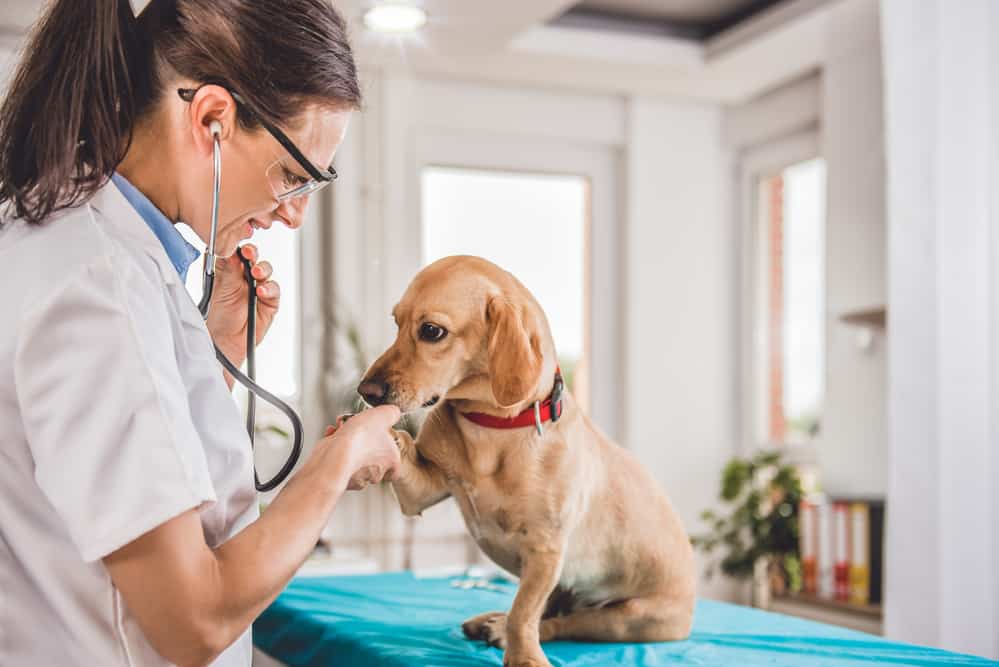
The recommended frequency of vaccination for puppies and adult dogs:
Puppies require a series of vaccinations in their first year
Vaccinations play a crucial role. For puppies, it’s essential to follow a proper vaccination schedule to protect them from various diseases. Puppies usually receive their first set of vaccinations at around 6-8 weeks of age.
First vaccination: At the initial visit to the veterinarian, your puppy will receive a combination vaccine known as the 5-in-1 vaccine. This vaccine protects against five common diseases: distemper, hepatitis, parvovirus, parainfluenza, and leptospirosis.
Boosters: Puppies require multiple doses of the 5-in-1 vaccine to ensure adequate protection. These booster shots are typically given every three to four weeks until they reach 16 weeks of age.
During this time, it’s important to keep your puppy away from other dogs or areas where they may come into contact with infectious agents. This helps minimize the risk of exposure before they have built up sufficient immunity.
Adult dogs need regular booster shots
Once your puppy has completed their initial series of vaccinations, they transition into adulthood and require regular booster shots to maintain immunity against diseases.
Annual boosters: Adult dogs generally receive annual booster shots for core vaccines such as distemper and parvovirus.
Three-year interval: Some vaccines, like rabies, may be administered every three years depending on local regulations and recommendations.
It’s crucial to consult with your veterinarian regarding the specific vaccination schedule for your adult dog as it can vary based on factors such as geographical location and lifestyle.
Frequency depends on individual factors and veterinarian recommendations
The frequency of vaccinations for both puppies and adult dogs can vary depending on several factors:
Lifestyle: Dogs that frequently interact with other animals or spend time in environments where they may be exposed to infectious diseases may require more frequent vaccinations.
Geographical location: The prevalence of certain diseases can vary based on your location. Your veterinarian will consider this when determining the appropriate vaccination schedule for your dog.
Health status: Dogs with underlying health conditions or compromised immune systems may require additional vaccinations or more frequent boosters.
It’s important to note that while vaccines are crucial, over-vaccination can have adverse effects on a dog’s health. Veterinarians take into account all these factors and provide personalized recommendations to ensure your dog receives the necessary protection without unnecessary risks.
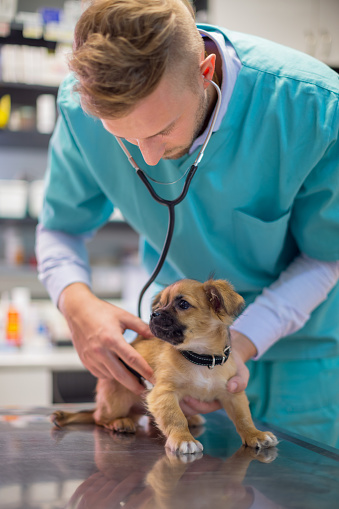
Exploring the coverage provided by the 5-in-1 vaccine for puppies:
If you’ve recently welcomed a new canine companion into your life, one of the most important responsibilities you have as a pet parent is ensuring their health and well-being. One crucial aspect of this is making sure they receive the necessary vaccinations to protect them from various diseases. The 5-in-1 vaccine for puppies is an essential tool in safeguarding your furry friend against several common illnesses.
Protects against multiple diseases
The 5-in-1 vaccine offers comprehensive protection against five different diseases: distemper, parvovirus, adenovirus, parainfluenza, and leptospirosis. Each of these diseases poses a significant threat to your puppy’s health and can lead to severe illness or even death if left untreated. By administering this vaccine, you are taking proactive steps to shield your pet from these potentially devastating conditions.
Covers major viral and bacterial infections
This combination vaccine covers both viral and bacterial infections that commonly affect puppies. Distemper is a highly contagious viral disease that attacks the respiratory, gastrointestinal, and nervous systems infected dogs. Parvovirus causes severe diarrhea and vomiting, leading to dehydration and weakness. Adenovirus type 2 primarily affects the respiratory system older dogs, causing coughing and other respiratory symptoms. Parainfluenza is another respiratory virus that can contribute to kennel cough in dogs. Finally, leptospirosis is a bacterial infection that can be transmitted through contact with contaminated water or infected animals.
Essential for preventing severe illnesses
The 5-in-1 vaccine plays a critical role in preventing severe illnesses in puppies. Without proper vaccination, young dogs are more susceptible to contracting these diseases due to their developing immune systems. The consequences can be dire, ranging from prolonged illness to severe disease requiring extensive veterinary care to fatal outcomes.
By vaccinating your puppy with the 5-in-1 shot, you are significantly reducing the risk of them contracting these serious diseases. This not only protects their health but also helps prevent the spread of these illnesses to other dogs in your community.
Recognizing symptoms and seeking veterinary care
While the 5-in-1 vaccine provides robust protection, it’s important to be aware that no vaccine is 100% foolproof. In rare cases, vaccinated puppies may still contract one of the diseases covered by the vaccine. Therefore, it’s crucial to stay vigilant and recognize any potential symptoms.
If your puppy starts coughing, vomiting, or experiencing diarrhea, it could be a sign of an underlying illness. Promptly consult with your vet if you notice infected animal has any concerning symptoms or changes in behavior. They will be able to conduct tests such as a full titer test or blood test, to determine if your pet needs additional medical attention.
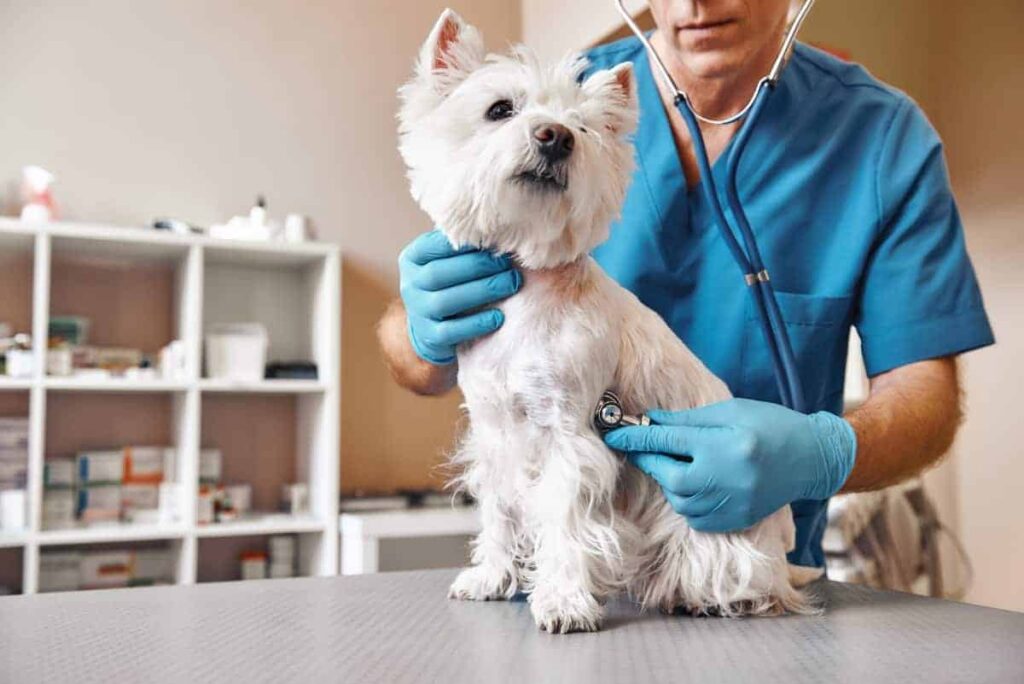
Cost considerations and timing of puppy vaccinations:
Vaccination costs vary depending on location and veterinary clinic
One of the first things to consider when planning your puppy’s vaccination schedule is the cost. Vaccination costs can vary depending on your location and the veterinary clinic you choose. It’s essential to research different clinics in your area to find one that offers affordable yet quality vaccinations for your furry friend.
Keep in mind that while cost is important, it shouldn’t be the only factor influencing your decision. The health and well-being of your puppy should always take precedence. Look for a reputable clinic with experienced veterinarians who prioritize the safety and effectiveness of their vaccines.
Timing is crucial to ensure proper protection
Timing plays a critical role in ensuring that your puppy receives proper protection from diseases. Vaccinations are typically administered in a series, starting at around six to eight weeks of age. This initial round helps boost their immune system and protect against common canine illnesses.
The subsequent rounds of vaccinations are usually given every two to four weeks until the puppy reaches around 16 weeks old. This schedule allows for optimal immune response development and ensures long-term protection against various diseases.
It’s important not to delay or skip any scheduled vaccinations as this could leave your puppy susceptible to potentially life-threatening conditions. Consult with your veterinarian about the specific timing requirements for each vaccine based on your puppy’s breed, health condition, and local disease prevalence.
Budgeting for vaccines is important for responsible pet ownership
As a responsible pet owner, budgeting for vaccines should be a priority. Vaccinations are necessary preventive measures that help safeguard your puppy’s health, but they do come at a cost.
Consider setting aside money specifically dedicated to covering vaccination expenses throughout the year. By doing so, you’ll ensure that you can provide timely immunizations without any financial strain.
To help manage costs effectively, explore options such as pet insurance plans or wellness packages offered by veterinary clinics. These can provide discounted rates or bundled services that include vaccinations, regular check-ups, and other preventive care.
Remember, investing in your puppy’s health now through proper vaccinations can save you money in the long run by preventing costly treatments for preventable diseases.
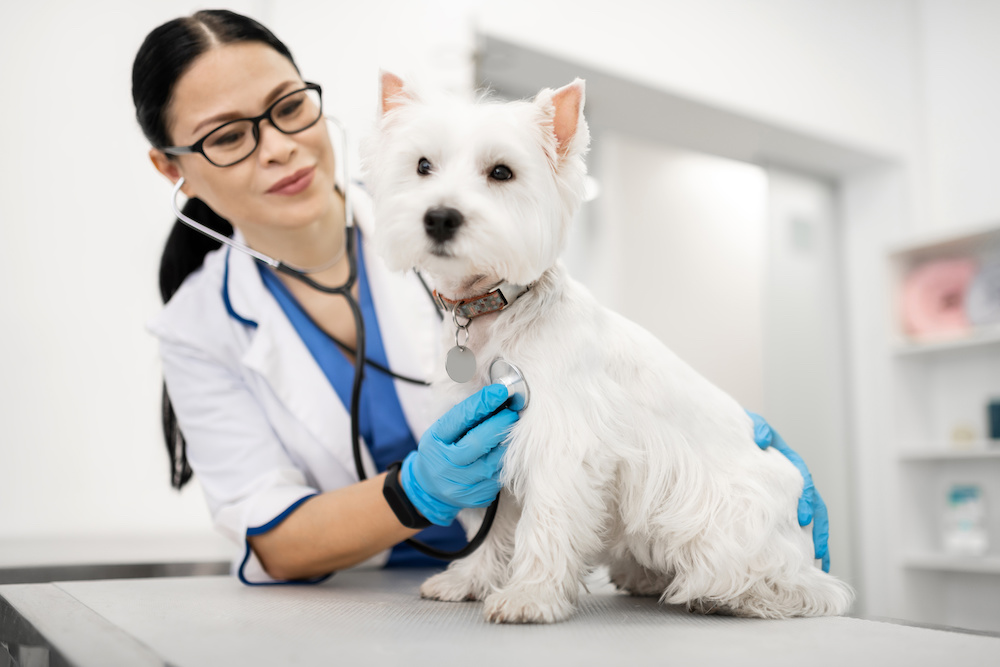
Tips for ensuring a smooth vaccination experience for your puppy:
Ensure your puppy is healthy before vaccinating
Before getting your new puppy or dog vaccinated though, it’s crucial to ensure they are in good health. Take them to a veterinarian for a thorough check-up to rule out any underlying conditions that could potentially complicate the vaccination process. A healthy puppy will have a stronger immune system, increasing the effectiveness of the vaccine and reducing the risk of adverse reactions.
Provide comfort during injections
Injections can be uncomfortable for puppies, so it’s important to provide them with comfort and reassurance during the process. Here are some ways you can make the experience less stressful for your furry friend:
Hold your puppy gently but securely to prevent them from squirming or escaping.
Use soothing words and a calm tone of voice to help relax them.
Offer treats or rewards before and after each injection as positive reinforcement.
Distract your puppy with their favorite toy or engage in gentle petting to divert their attention from the injection.
By creating a comforting environment, you can help alleviate anxiety and make vaccinations a more pleasant experience for your pup.
Schedule appointments during calm periods
To minimize stress for both you and your puppy, try scheduling vaccination appointments during calm periods. Avoid peak hours when there may be more noise or activity at the veterinary clinic. This way, you can reduce distractions and create a quieter environment that will help keep your puppy relaxed during their first vet visit ever.
Scheduling appointments during less busy times may allow veterinarians to spend more time addressing any concerns or questions you may have about your pet’s wellness. It ensures that they have ample time to properly administer vaccinations without feeling rushed.
Remember that early morning or late afternoon slots tend to be less crowded at most clinics. Check with your veterinarian’s office for their least busy times so you can plan accordingly.
Block out enough time for each visit
When booking an appointment for your puppy’s vaccinations, make sure to block out enough time for the visit. Vaccinations are not a quick process and require proper care and attention from both you and the veterinarian.
During the appointment, the veterinarian will perform a thorough examination of your puppy’s overall health before administering the necessary injections. They may also take this opportunity to discuss any specific care instructions or answer any questions you have regarding your pet’s wellness.
By allowing sufficient time for each visit, you ensure that both you and your puppy receive the attention needed without feeling rushed or overwhelmed.
Remember, regular vaccination visits are an essential part of responsible pet ownership. By following these tips, you can help ensure a smooth vaccination experience for adult dog and your new furry companion while prioritizing their health and well-being.
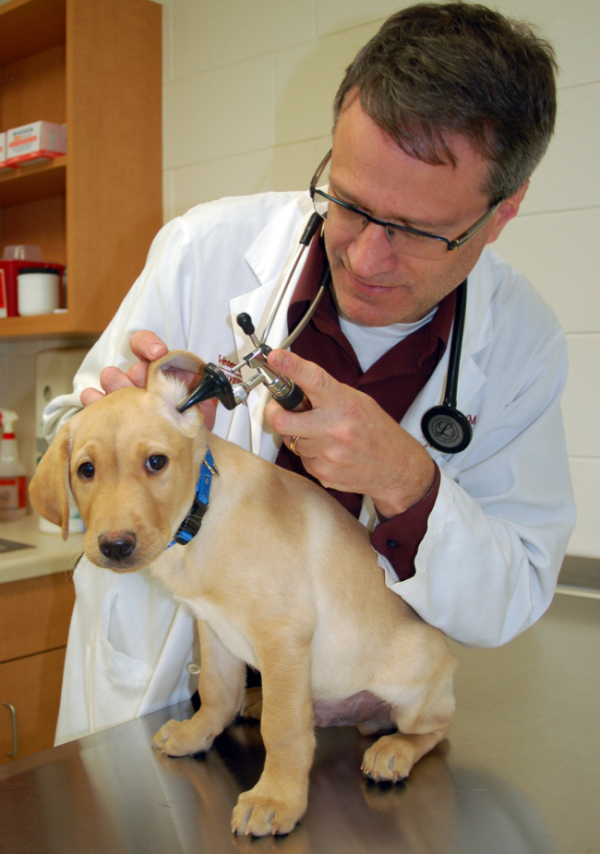
The Significance of Following the 5-in-1 Vaccine Schedule for Your Puppy’s Health
Full Immunity Development
Ensuring your puppy receives the 5-in-1 vaccine according to schedule is crucial for their overall wellness. This comprehensive vaccine protects against five common diseases: distemper, hepatitis, parainfluenza, parvovirus, and leptospirosis. Each component of the vaccine plays a vital role in building your puppy’s immunity.
By following the recommended schedule core vaccinations, you allow your puppy’s immune system to develop robust defenses against these diseases. Vaccines work by introducing a small amount of weakened or inactive pathogens into the body, prompting an immune response without causing illness. This mild form of exposure helps train your puppy’s immune system to recognize and fight off these diseases effectively.
Outbreak Prevention
Another key reason for adhering to the 5-in-1 vaccine schedule is to protect not only your own pup but also other dogs in your community or kennel setting. Vaccination helps prevent outbreaks of highly contagious diseases that can spread rapidly among other unvaccinated dogs and animals.
Imagine a scenario where one dog in a kennel contracts parvovirus due to incomplete vaccination. Without proper protection, this disease can quickly infect other susceptible dogs within close proximity. By diligently following the 5-in-1 vaccine schedule, you contribute to creating a safer environment for all dogs by minimizing the risk of outbreaks.
Minimizing Vulnerability
Delaying or skipping any part of the 5-in-1 vaccine schedule can leave your puppy vulnerable to potentially life-threatening diseases. Puppies are particularly susceptible as their immune systems are still developing and may not be able to mount an effective defense against certain pathogens.
For example, the canine influenza, parvovirus, is highly contagious and affects puppies more severely than adult dogs. It attacks rapidly dividing cells in their bodies, particularly those in the intestines and bone marrow. Delaying or missing a vaccine dose increases the chances of your puppy contracting a severe form of parvovirus, which can lead to severe dehydration, bloody diarrhea, and even death.
To protect your furry friend from such risks, it’s essential to strictly adhere to the 5-in-1 vaccine schedule recommended by your veterinarian.
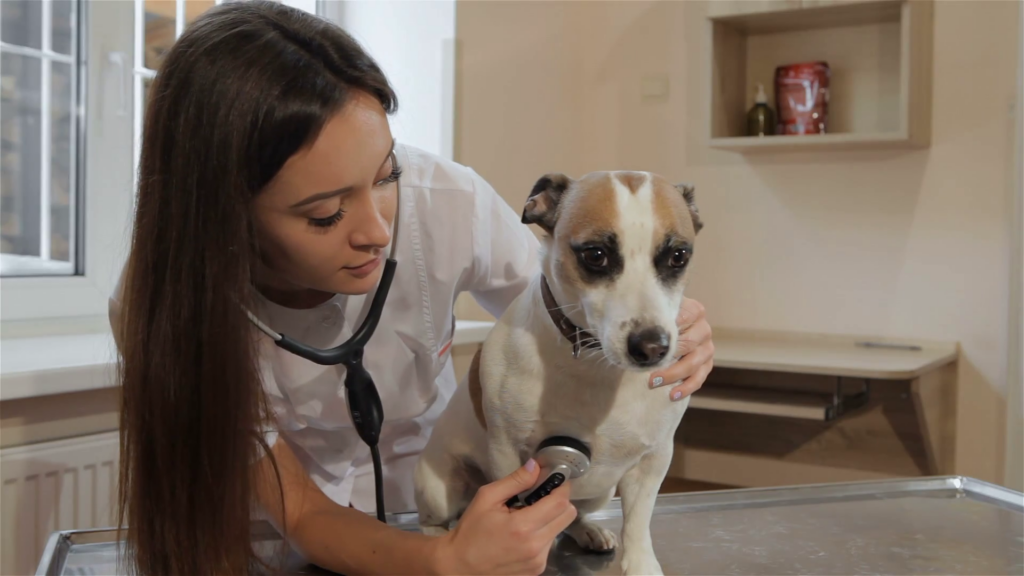
Concluding thoughts on the 5-in-1 vaccine for puppies schedule:
In conclusion, the 5-in-1 vaccine for puppies is a crucial component of their overall health and well-being. By providing protection against multiple diseases in a single shot, this vaccine simplifies the vaccination process and ensures comprehensive coverage. Understanding the puppy vaccination schedule and administering the 5-in-1 vaccine at the appropriate times is essential for optimal effectiveness.
The recommended frequency of vaccination for puppies and adult dogs varies depending on factors such as age, lifestyle, and local disease prevalence. It is important to consult with your veterinarian to determine the most suitable vaccination schedule for your furry friend.
The 5-in-1 vaccine offers protection against common canine diseases like distemper, parvovirus, adenovirus type 2, canine parainfluenza virus, and leptospirosis. This broad spectrum of defense helps safeguard your puppy from serious illnesses that can be costly to treat or even fatal.
Considerations regarding cost and timing should also be taken into account when planning puppy vaccinations. While there may be initial expenses associated with vaccines, they are a worthwhile investment in your pet’s long-term health. Adhering to the recommended schedule ensures timely protection against potential threats.
To ensure a smooth vaccination experience for your puppy, it is advisable to follow some simple tips. Familiarize yourself with any potential side effects or precautions associated core vaccines and with the 5-in-1 vaccine. Make sure your puppy is healthy before receiving vaccinations and provide comfort during and after each shot.
Following the 5-in-1 vaccine schedule diligently holds immense significance for your puppy’s health. By staying up-to-date with vaccinations, you are actively contributing to preventing diseases that can harm or even endanger your beloved companion.
In summary, prioritize your puppy’s well-being by understanding and following the appropriate 5-in-1 vaccine schedule recommended by your veterinarian. By doing so, you are taking proactive steps towards safeguarding their health and ensuring a happy and healthy future together.
FAQs
Q: Are there any potential side effects of the 5-in-1 vaccine for puppies?
The 5-in-1 vaccine for puppies may cause mild side effects such as soreness at the injection site, lethargy, or a slight fever. These symptoms are usually temporary and resolve on their own. However, if you notice any severe or persistent reactions to other vaccinations, it is important to contact your veterinarian immediately.
Q: Can I administer the 5-in-1 vaccine to my puppy at home?
It is strongly recommended to have a licensed veterinarian administer the 5-in-1 vaccine to ensure proper administration and monitoring. Veterinarians have the expertise to handle any potential adverse reactions and provide appropriate care if needed.
Q: Is it necessary to vaccinate my puppy if they will not be exposed to other dogs?
Even if your dog vaccinated puppy will not have direct contact with other dogs, it is still important to vaccinate them. Diseases can be transmitted through various means such as contaminated surfaces or wildlife carriers. Vaccinations provide crucial protection for infected dog against these potential sources of infection.
Q: Can the 5-in-1 vaccine protect my puppy from all diseases?
While the 5-in-1 vaccine offers protection against several common canine diseases, it does not cover every possible illness. Your veterinarian may recommend additional vaccines based on factors such as regional disease prevalence or specific lifestyle risks that your puppy may encounter.
Q: What happens if I miss a scheduled vaccination for my puppy?
It is best to adhere to the recommended vaccination schedule as closely as possible. However, if you do miss a scheduled vaccination, consult with your veterinarian about rescheduling as soon as possible. They can guide you on how best to proceed in order to maintain effective immunization coverage for your furry friend.
